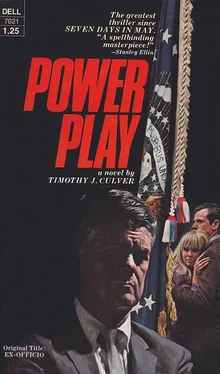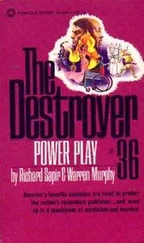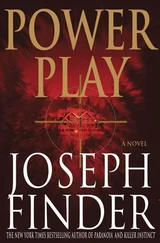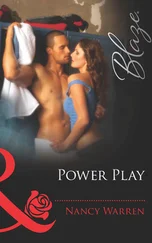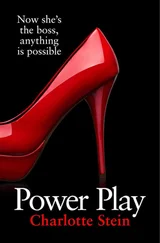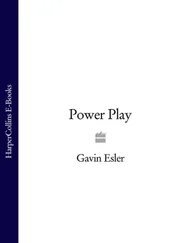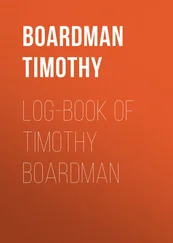Timothy Culver - Power Play
Здесь есть возможность читать онлайн «Timothy Culver - Power Play» весь текст электронной книги совершенно бесплатно (целиком полную версию без сокращений). В некоторых случаях можно слушать аудио, скачать через торрент в формате fb2 и присутствует краткое содержание. Город: New York, Год выпуска: 1971, ISBN: 1971, Издательство: Dell Books, Жанр: roman, на английском языке. Описание произведения, (предисловие) а так же отзывы посетителей доступны на портале библиотеки ЛибКат.
- Название:Power Play
- Автор:
- Издательство:Dell Books
- Жанр:
- Год:1971
- Город:New York
- ISBN:978-0440070214
- Рейтинг книги:5 / 5. Голосов: 1
-
Избранное:Добавить в избранное
- Отзывы:
-
Ваша оценка:
- 100
- 1
- 2
- 3
- 4
- 5
Power Play: краткое содержание, описание и аннотация
Предлагаем к чтению аннотацию, описание, краткое содержание или предисловие (зависит от того, что написал сам автор книги «Power Play»). Если вы не нашли необходимую информацию о книге — напишите в комментариях, мы постараемся отыскать её.
Occupation: Former President of the United States
Problem: Obsessive desire for power.
Loved and hated more than any man on earth, commanding absolute loyalty from the men and women who once had served him, defying the government he once had headed, Bradford Lockridge pursued his final and possibly insane vision of glory...
Power Play — читать онлайн бесплатно полную книгу (весь текст) целиком
Ниже представлен текст книги, разбитый по страницам. Система сохранения места последней прочитанной страницы, позволяет с удобством читать онлайн бесплатно книгу «Power Play», без необходимости каждый раз заново искать на чём Вы остановились. Поставьте закладку, и сможете в любой момент перейти на страницу, на которой закончили чтение.
Интервал:
Закладка:
She pressed her hands to her face and turned to the wall, leaning hard against it. “Oh, Fred, Fred,” she murmured, in bitter reproof, in hurt and disappointment. “Oh, Fred.”
ii
It was ten past ten when Evelyn walked into the private room at the end of the long corridor, and Howard was already there, his papers spread all over the bed and the tray and the table and the second chair. Bradford and Howard were deeply involved, the way they always were when working on the memoirs, and Howard looked up with distracted eyes to say, “Oh. Let me clear off a chair for you.”
“No, that’s all right,” she said. “As long as Bradford has somebody to be with him, I’ll go get myself some breakfast.”
Howard jabbed a casual thumb at Bradford, saying, “They’re supposed to take him away at ten-thirty. I’ll come down and join you.”
“Fine,” she said, and smiled brightly at Bradford. “How are you this morning?”
“Bored. How do you expect a man to be?” Inactivity always strained Bradford’s sense of humor.
“That means you’re healthy,” Evelyn told him, and went away to take the elevator back down to the first floor, where there was a cafeteria half full of nurses and interns and Gray Ladies, making Evelyn almost the only one in sight not in some kind of uniform.
It was possible to order bacon and eggs but not, as it turned out, a good idea. Evelyn was still picking at her plate a quarter of an hour later when Howard came down. He waved to her as he went over to get something to eat, and she pointed at her empty coffee cup. He nodded.
Howard Lockridge was Bradford’s nephew, the younger son of Bradford’s brother Sterling. Howard was thirty-seven now, a tall and stocky man with a prematurely balding head that gleamed ludicrously in all lights. His glasses had round wire frames, and the lenses also gleamed, making his head predominantly a triangle of reflected light, glasses and brow, with a slightly chubby face lost beneath it.
Howard was a senior editor at Random House, which was publishing Bradford’s memoirs, in seven projected volumes. The first three volumes had already been published, and all had received generally good reviews except for the inevitable few critics who took the opportunity to criticize Bradford’s political record rather than the book he had written. The first volume was called The Grass Roots of Power, and told about Bradford’s father, Solomon Lockridge, who had been a politician of some import on the local level in Pennsylvania in the first two or three decades of this century, and told also of Bradford’s own entrance into politics, winning a seat in the House of Representatives early in the Depression.
The second volume, The Politics of Hunger, concerned itself with the New Deal years of the thirties, during most of which Bradford was a Congressman from Pennsylvania. The book ended with his first winning a Senate seat on the eve of the Second World War. The war itself, and the first part of Bradford’s Senate career, were covered in the third volume, The Trumpets of War, which had been published just two months before.
Now they were at work on the fourth volume, The Temporary Peace, concerning the postwar years of the late forties and early fifties. Bradford had still been a Senator then, and had seen much of the turbulence of that period from the inside, since the various Congressional committees had become all at once the most important single factor in setting the tone of national life. This volume was late, one deadline having already been missed, not because Bradford had grown tired of the work but because he considered that split decade after the war perhaps the most important and crucial era in American history. “Everything that’s wrong with us today,” he said once, “comes from that decade, and everything that’s right with us today comes from before that decade.” He also believed the nation was more and more returning to the attitudes of that time, which he feared would be a disaster, and therefore he wanted to be sure he got the message of The Temporary Peace absolutely right.
The three projected volumes were The Coming of Winter, concerning the Cold War in its endless phases, The Servant of the Nation, concerning his own controversial Presidency, and finally Toward Tomorrow, which was to be both his summation of events since he’d left office and his projection of the future. There was a body of material already done on each of these books, notes and general outlines, but the real writing of each book was being taken in order, with Bradford dictating a first draft into a tape recorder, then going over the typewritten transcript to make what changes he thought proper, and then Howard putting the whole thing through the typewriter all over again, polishing the prose and straightening out Bradford’s occasionally over-convoluted sentences. The final step was for Bradford and Howard to argue their way line by line through Howard’s revised version, then agree together on the order of the chapters, and send a copy of the once-more-retyped manuscript to Sterling for one of his students at Lancashire to do the index.
Bradford wasn’t Howard’s only author, of course, nor even the most profitable one, but he was — in addition to being his uncle — the most prestigious name on Howard’s list, so he seemed always to have unlimited time to spend with Bradford. He’d been known to move out to Eustace for weeks at a stretch, sometimes with Grace and the kids but more often by himself, and it was no surprise that he was now taking the opportunity of Bradford’s presence in New York to work with him some more. The Temporary Peace was overdue, and even ex-Presidents have to meet their deadlines.
Howard now came over to Evelyn’s table carrying a tray full of sandwiches and coffee cups. He gave Evelyn her fresh cup, and that left two for himself, plus three sandwiches, all white bread and wrapped in clear plastic. He sat down opposite Evelyn and said, “Joe says he should be down by twelve, so take your time.”
“I wish I’d brought Dinah,” Evelyn said, thinking of the little girl at home in Eustace with only the servants. “To keep me company.”
“Thanks a lot,” Howard said. He was unwrapping one of the sandwiches, which turned out to be two slices of bread and one slice of American cheese. Howard studied it gloomily and said, “Why do I always buy this stuff? I know what it’s going to be like, why do I do it?” He took a huge mouthful and sat moodily chewing it.
Evelyn sat there stirring her coffee. Howard made her nervous, and never more so than when she met him on neutral ground, away from the safety of Eustace. He had never been anything but kind to her, though at times impatient, but she lived in fear of his saying something brutal to her. He could be incredibly caustic, and it seemed inevitable that some day he would turn that verbal knife loose on her. Why did it seem inevitable? She had no idea.
Howard shoved bread and cheese into one bulging cheek and said, “You were there, weren’t you?”
“What?” She had no idea what he was talking about, and that increased her nervousness.
“When it hit him,” Howard explained. “Out in sunny California.”
Evelyn remembered how strongly Howard had opposed Bradford’s going out there, how he had characterized it as a “supermarket opening,” and she supposed now he would blame that trip for Bradford’s condition no matter what Uncle Joe and the other doctors decided. She said, “Yes, of course, I was sitting right beside him.”
“Tell me about it.”
“Howard, I really don’t like to go over it and over it. It was very frightening.”
“I’m sure it was,” he said, and washed down sandwich with coffee. “I’m not on a curiosity binge,” he said. “I’m Brad’s editor — face it, I’m his biographer — and I want to know what happened. I wouldn’t ask Harrison, and I wouldn’t believe his answer if I did, so that leaves you.”
Читать дальшеИнтервал:
Закладка:
Похожие книги на «Power Play»
Представляем Вашему вниманию похожие книги на «Power Play» списком для выбора. Мы отобрали схожую по названию и смыслу литературу в надежде предоставить читателям больше вариантов отыскать новые, интересные, ещё непрочитанные произведения.
Обсуждение, отзывы о книге «Power Play» и просто собственные мнения читателей. Оставьте ваши комментарии, напишите, что Вы думаете о произведении, его смысле или главных героях. Укажите что конкретно понравилось, а что нет, и почему Вы так считаете.
